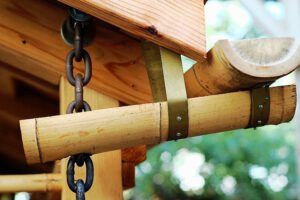Gutters Jacksonville are the water discharge system of your building. They are also known as eavestrough, eaves-shoot, or surface water collection channels. Generally, they are made of metal and are available in stainless steel or aluminum. Besides, they can be made of seamless design or mitered corners.

Stainless steel gutters are made of heavy-duty, durable material that doesn’t stain or corrode. This makes them perfect for high-traffic areas. They are also extremely strong and will last for 50 years or more. They can withstand dings and dents caused by ladders, falling branches, and even the harshest weather conditions.
They are also very rust-resistant. In addition, stainless steel gutters require almost no maintenance. This makes them a great investment. They can last for decades with proper installation. This makes them a good choice for homes in areas with harsh weather. Stainless steel gutters may be more expensive than aluminum, but they are worth the extra money they cost.
Stainless steel gutters are often installed by a professional gutter contractor. They should have extensive experience in installing this type of guttering. The contractor should also be familiar with the process of removing clogged downspouts. In order to remove clogs from stainless steel gutters, a contractor should carefully inspect the slope of the roof and make necessary adjustments. The contractor will also have to cut the pieces to fit.
While stainless steel gutters are a great investment, it can be difficult to find an installer who specializes in installing them. The installation process can be time-consuming, difficult, and expensive. Make sure that you find a contractor with experience in seamless stainless steel gutter installation.
When it comes to gutters, there are many options. One of the most common options is aluminum. This is a durable and cost-effective option that will help keep the exterior of your home looking clean. However, there are several disadvantages to using this material. Below, we will discuss some of the things to keep in mind before choosing an aluminum gutter for your home.
The first thing to keep in mind is that aluminum gutters can clog easily. Without regular cleaning, they can become clogged with leaves and other debris. This can lead to water damage. To avoid this, use a gutter clog prevention product. This product will help keep your aluminum gutters free from debris.
Another advantage of aluminum gutters is that they are highly corrosion-resistant. When they are coated with aluminum oxide, they will not rust, which means they will not break easily, even if they get a little clogged. However, aluminum gutters are not impervious to hail and strong winds. For this reason, they are best used in homes where there are no severe weather conditions, such as strong winds and hail. Aluminum gutters also have a long life expectancy.
Another benefit of aluminum gutters is their customizability. They come in various gauges and thicknesses. This means that they can be custom-made to fit any size of home. Additionally, you can select the gutter style that suits your home’s exterior best.
Mitered corners on gutters can be tricky to keep clean. The corners may become rusted, black, or green. The most common cause is old gutter seals, but other culprits can include decomposing debris and extreme temperature changes. Here are a few tips for maintaining the integrity of your gutters.
There are two types of mitered corners: box miters and strip miters. Box miters are easier to install and look more professional. Strip miters, on the other hand, require two 45-degree cuts on the two abutting pieces. Both types of corners can be sealed with sealer and rivets.
Hand-mitered gutter corners are made by skilled gutter installers. Unlike traditional gutters, custom mitered gutters have only one seam, which ensures that they will stay in the corners longer. They can also be customized to fit tighter corners and give the best aesthetic appearance to the house. In the traditional gutter installation, nails are used to attach the gutter to a rafter or fascia board. These nails have limits, however, and can pull out under the weight of water. If nails pull out, gutters will sag and fall away from the house.